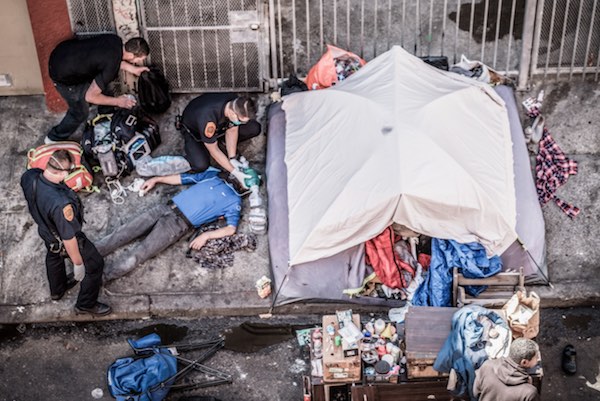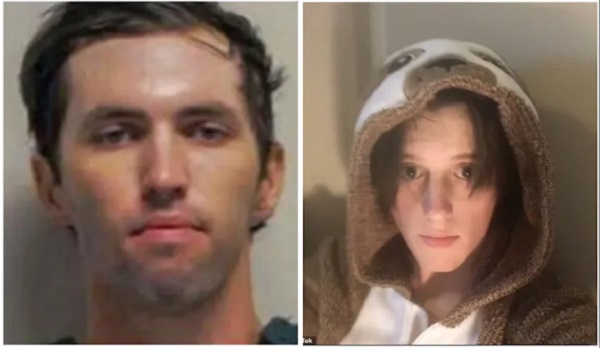Opinion
Why Everything We Thought About Drugs Was Wrong

Michael Schellenberger is a leading environmentalist and progressive activist who has become disillusioned with the movements he used to help lead.
His passion for the environment and progressive issues remains, but his approach is unique and valuable.
Michael Shellenberger is author of the best-selling “Apocalypse Never”
This newsletter was sent out to Michael Schellenberger’s subscribers on Substack

The road to hell was paved with victimology
In the late 1990s and early 2000s, I worked with a group of friends and colleagues to advocate drug decriminalization, harm reduction, and criminal justice reform. I helped progressive Congressperson Maxine Waters organize civil rights leaders to advocate for needle exchange so that heroin users wouldn’t get HIV-AIDS. I fought for the treatment of drug addiction as a public health problem not a criminal justice one. And we demanded that housing be given to the homeless without regard for their own struggles with drugs.
Our intentions were good. We thought it was irrational to criminalize the distribution of clean needles to drug users when doing so had proven to save lives. We were upset about mass incarceration, particularly of African Americans and Latinos, for nonviolent drug offenses. And we believed that the approach European nations like the Netherlands and Portugal had taken to decriminalize drugs, and expand drug treatment, was the right one.
But it’s obvious now that we were wrong. Over the last 20 years the U.S. liberalized drug laws. During that time, deaths from illicit drugs rose from 17,000 to 93,000. Three three times more people die from illicit drug use than from car accidents; five times more die from drugs than homicide. Many of those people are homeless and die alone in the hotel rooms and apartment units given away as part of the harm reduction-based “Housing First” approach to homelessness. Others are children found dead by their parents on the floors of their rooms.
Many progressives today say the problem is that we didn’t go far enough, and to some extent they are right. A big factor behind rising drug deaths has been the contamination of cocaine, heroin, and counterfeit prescription opioids with fentanyl. Others say that concerns over rising drug deaths are misplaced, and that alcohol and tobacco kill more people than illicit drugs.
But drug deaths were rising in the U.S. long before the arrival of fentanyl, and most of the people who die from tobacco and alcohol do so in old age, not instantly, like they do when they are poisoned or overdose. Of the nearly 90,000 people in the U.S. who die of alcohol-related causes annually, just 2,200 die immediately from acute alcohol poisoning.
What about mass incarceration? It’s true that nearly half of the people in federal prisons are there for nonviolent drug offenses. But there are eight times more people in state prisons than federal prisons, and just 14 percent of people in state prisons are there for nonviolent drug offenses and just 4 percent for nonviolent possession. Half of state prisoners are there for murder, rape, robbery and other violent offenses.
While it’s true that both Netherlands and Portugal reduced criminal penalties, both nations still ban drug dealing, arrest drug users, and sentence dealers and users to prison or rehabilitation. “If somebody in Portugal started injecting heroin in public,” I asked the head of drug policy in that country, “what would happen to them?” He said, without hesitation, “They would be arrested.”
And being arrested is sometimes what addicts need. “I am a big fan of mandated stuff,” said Victoria Westbrook. “I don’t recommend it as a way to get your life together, but getting indicted by the Feds worked for me. I wouldn’t have done this without them.” Today Victoria is working for the San Francisco city government to integrate ex-convicts back into society.
But people in progressive cities are today shouted down for even suggesting a role for law enforcement. “Anytime a person says, ‘Maybe the police and the health care system could work together?’ or, ‘Maybe we could try some probation or low-level arrests,’ there’s an enormous outcry,” said Stanford addiction specialist Keith Humphreys. “‘No! That’s the war on drugs! The police have no role in this! Let’s open up some more services and people will come in and use them voluntarily!’”
Why is that? Why, in the midst of the worst drug death crisis in world history, and the examples of Portugal and Netherlands, are progressives still opposed to shutting down the street fentanyl markets in places like San Francisco that are killing people?
We Care A Lot

The City of San Francisco opened this homeless encampment virtually on the front steps of city hall.
There are many financial interests that make money from the drug crisis and so it’s reasonable to ask whether progressive inaction stems from political donations from addiction, homelessness, and service providers. California spends more on mental health than any other state but saw its homeless population rise 31 percent even as it declined 18 percent in the rest of the U.S. San Francisco spends significantly more on cash welfare and housing for the homeless than other cities but has one of the worst homeless and drug death crises, per capita.
But we progressives who fought to change drug laws and attitudes were not primarily motivated by money. Sure, we needed George Soros and other wealthy individuals to support our work. But we could have made more money doing other things, and Soros and others have nothing to gain financially from drug decriminalization. The same goes for homelessness. The most influential Housing First advocates work in non-profits and universities.
Is it because so many progressives who fought for decriminalization themselves used drugs? Everybody I knew in that period, myself included, smoked marijuana, drank alcohol, and experimented with psychedelics and occasionally with harder drugs. Several of the donors who supported our work were known to smoke marijuana.
But I saw no evidence that advocates for drug decriminalization and harm reduction used illicit drugs at a higher rate than the rest of the population. Some used them less and showed far greater awareness of the harms of drugs, including addiction, than many other people I have met, likely due to their higher socio-economic status as much as their specific knowledge of the issue.
And the core motivation of the people I worked with was ideological. Many people, including many progressives, were libertarian, and fundamentally believed the government did not have a right to tell able-bodied adults what drugs they could and could not use. But many more, myself included, were upset by mass incarceration, and the ways in which incarceration destroys families, disproportionately African American and Latino ones.
Our views were too simplistic and wrong. Many things undermine families and communities, of all colors, well before anyone is incarcerated, including drugs and the crime and violence associated with them. And, violent communities attract the drug trade more than the drug trade makes communities violent, both scholars and journalists find.
But mostly we were too emotional. Progressives hold two moral values particularly deeply: caring and fairness. “Across many scales, surveys, and political controversies,” notes the psychologist Jonathan Haidt, “liberals turn out to be more disturbed by signs of violence and suffering, compared to conservatives, and especially to libertarians.”
The problem is that, in the process of valuing care so much, progressives abandon other important values, argue Haidt and other researchers in a field called Moral Foundations Theory. While progressives (“liberal” and “very liberal” people) hold the values of Caring, Fairness, and Liberty, they tend to reject the values of Sanctity, Authority, and Loyalty as wrong. Because these values are so deeply held, often subconsciously, Moral Foundations Theory explains well why so many progressives and conservatives today view each other as not merely uninformed but immoral.
The Victim God

California Governor Gavin Newsome has proposed a 12 Billion dollar plan to build homes for California’s entire homeless population.
The values of Sanctity and Authority appear to explain why conservatives and moderate Democrats more than progressives favor prohibitions on things like sleeping on sidewalks, public use of hard drugs, and other behaviors. In a more traditional morality, drug use is seen as violating the Sanctity of the body, and the importance of self-control. Sleeping on sidewalks is seen as violating the value of Authority of laws and thus Loyalty to America. Writes Haidt, “liberals are often willing to trade away fairness when it conflicts with compassion or their desire to fight oppression.”
But there is a twist. Progressives don’t trade away Fairness for victims, only for those they see as privileged. Progressives still value Fairness, but more for victims, and their progressive allies, than for everyone equally, and particularly not for people progressives view as the oppressors and victimizers.
Conservatives and moderates tend to define Fairness around equal treatment, including enforcement of the law. They tend to believe we should enforce the law against the homeless man who is sleeping and urinating on BART, our subway system, even if he is a victim. Progressives disagree. They demand we take into account that the man is a victim in deciding whether to arrest and how to sentence whole classes of people including the homeless, mentally ill, and addicts.
Progressives also value Liberty, or freedom, differently from conservatives. Many progressives reject the value of Liberty for Big Tobacco and cigarette smokers but embrace the value of Liberty for fentanyl dealers and users. Why? Because progressives view fentanyl dealers and users, who are disproportionately poor, sick, and nonwhite, as victims of a bad system.
Progressives also value Authority and Loyalty for victims above everyone else. San Francisco homelessness advocate Jennifer Friedenbach told me that we should “center unhoused people, primarily black and brown folks, that are experiencing homelessness, folks with disabilities. They’re the voices that should be centered.” She is not rejecting Authority or Loyalty. Rather, she is suggesting that we should have Loyalty to the victims, and that they, not governments, should have Authority.
Indeed, progressives insist on taking orders, supposedly without questioning them, from the homeless themselves. “Drug use is often the only thing that feels good for them, to oversimplify it,” said Kristen Marshall, who oversees San Francisco’s response to drug overdoses. “When you understand that, you stop caring about the drug use and ask people what they need.”
The San Francisco Coalition on Homelessness has similarly argued that the city must let homeless people sit and lie on sidewalks, and camp in public spaces including parks and sidewalks, if that’s what they would prefer, rather than require them to stay in shelters. Once you decide, in advance, to let victims determine their fates, then much else can be justified.
Many progressives do something similar with Sanctity, which is to value some things as sacred or pure. Monique Tula, the head of the Harm Reduction Coalition, argues for “bodily autonomy” against mandatory drug treatment for people who break the law to support their addiction. In so doing, she is insisting upon the Sanctity of the body, not rejecting it. The difference between her definition of Sanctity and the traditional view of Sanctity was what violated it. Where traditional morality views recreational injection drug use as a violation of the Sanctity of the body, Tula, like many libertarians, believes that the state coercing sobriety is.
All religions and moralities have light and dark sides, suggests Haidt. “Morality binds and blinds,” he writes. On the one hand, they bind us together in groups and societies, helping us realize our individual and social needs, and are thus very positive. But religions and moralities can also create giant blind spots preventing us from seeing our dark sides, and thus can be very negative.
Victimology takes the truth that it is wrong for people to be victimized and distorts it by going a step further. Victimology asserts that victims are inherently good because they have been victimized. It robs victims of their moral agency and creates double standards that frustrate any attempt to criticize their behavior, even if they’re behaving in self-destructive, antisocial ways like smoking fentanyl and living in a tent on the sidewalk. Such reasoning is obviously faulty. It purifies victims of all badness. But by appealing to emotion, victimology overrides reason and logic.
Victimology appears to be rising as traditional religions are declining. Unlike traditional religions, many nontraditional religions are largely invisible to the people who hold them most strongly. A secular religion like victimology is powerful because it meets the contemporary psychological, social, and spiritual needs of its believers, but also because it appears obvious, not ideological, to them. Advocates of “centering” victims, giving them special rights, and allowing them to behave in ways that undermine city life, don’t believe, in my experience, that they are adherents to a new religion, but rather that they are more compassionate and more moral than those who hold more traditional views.
A Bad Case of San Fransickness

Case workers at San Francisco City Hall Homeless Encampment
“Safe Sleeping Sites” is the name San Francisco gives to parking lots of tents of homeless addicts shooting and smoking fentanyl and meth. They are expensive, costing the city $60,000 per tent to maintain. Some people say they look like a natural disaster, but with city-funded social workers providing services to the people in tents, they look to me more like a medical experiment, albeit one that no board of ethics would ever permit.
At the Sites the city isn’t providing drug treatment; it’s providing easy access to drugs. That includes cash in the form of welfare payments with which to purchase drugs, and the equipment with which to inject them. As such, progressives cities like San Francisco are directly financing the drug death crisis.
Is this Munchausen syndrome by proxy, which is when a parent deliberately makes their child sick so they can feel important? In San Fransicko, I consider this possibility, and ultimately conclude that while the progressive approach to drug addiction and homelessness can be fairly described as pathological altruism, it would be unfair to call it sadistic. Many of the drug-addicted and mentally ill homeless are, in fact, sick, and most progressives have good intentions.
But it is not unfair to point out that the city’s approach of playing the Rescuer is resulting in worsening addiction and rising drug deaths. Nor is it unfair to point out that we limit people’s potential for freedom by labeling them Victims and “centering” their trauma, rather than viewing victimization as an opportunity for heroism. Nor is it unfair to point out, as I have attempted to do by describing the history, that San Francisco’s political, business, and cultural leaders should all know better by now.
People suffering from addiction and living on the street are ill. To mix them up in speech and policy with people who are merely poor is deceptive. Leading scholars have for thirty years denounced the conflation of the merely poor with disaffiliated addicts. Yet progressive advocates for the homeless continue to engage in the same sleight of hand by using the single term “homeless,” tricking journalists, policy makers, and the public into mixing together groups of people who require different kinds of help.
Progressives justify their discourse and agenda in the name of preventing dehumanization, but the effect has been the opposite. In defending the humanity of addicts, progressives ended up defending the inhumane conditions of street addiction.
The morality of victimology contains a version of all six values identified in Moral Foundations Theory. The problem is that those values are oriented around those defined as Victims in a particular context, to the exclusion of everyone else. But not even the most devoted homeless activists could do whatever drug-addicted homeless people demand of them. The demand that we give Victims special political authority is thus really a demand to give special political authority to those who claim to represent the supposed Victims, namely homelessness advocates.
The power of victimology lies in its moralizing discourse more than in any single set of laws. I was struck in my research that progressive intellectuals and activists have had a far greater impact on public policy, and the reality on the streets, than countless progressive politicians.
It is notable that while academics and activists are the most influential individuals in shaping homeless policy in San Francisco and Los Angeles, they are also the least accountable. As the problem has worsened, their cultural and political power has grown, while voters understandably blame their local elected leaders for the crisis.
Progressive advocates and policy makers alike blame the drug war, mass incarceration, and drug prohibition for the addiction and overdose crisis, even though the crisis resulted from liberalized attitudes and drug laws, first toward pharmaceutical opioids, and then toward all drugs. This view is, on the one hand, a defensive and ideological reaction. But it is also an abdication of responsibility.
And so while we should hold our elected officials responsible, we must also ask hard questions of the intellectual architects of their policies, and of the citizens, donors, and voters who empower them. What kind of a civilization leaves its most vulnerable people to use deadly substances and die on the streets? What kind of city regulates ice cream stores more strictly than drug dealers who kill 713 of its citizens in a single year? And what kind of people moralize about their superior treatment of the poor, people of color, and addicts while enabling and subsidizing the conditions of their death?
Crime
Transgender Roomate of Alleged Charlie Kirk Assassin Cooperating with Investigation


From the Daily Caller News Foundation
The man accused of assassinating Turning Point USA (TPUSA) founder Charlie Kirk reportedly lives with a transgender-identifying “partner,” according to Fox News reporter Brooke Singman.
Authorities have arrested Tyler Robinson, 22, accusing him of gunning down Kirk during a TPUSA “Prove Me Wrong” event at Utah Valley University on Wednesday, during which the late activist was debating attendees on a variety of topics, including transgenderism. Authorities say that communications between Robinson and the biological male who identified as a transgender female confirm Robinson as the person responsible for the assassination of Kirk, Singman posted on X Saturday.
Kirk had engaged in a debate about transgender mass shooters with Hudson Kozak shortly before being assassinated. The subject became a hot-button issue following the Aug. 27 shooting during an all-school mass held at Annunciation Catholic School in Minneapolis that left two children dead.
Dear Readers:
As a nonprofit, we are dependent on the generosity of our readers.
Please consider making a small donation of any amount here.
Thank you!
Authorities had recovered a rifle containing ammunition that was reportedly marked with left-wing messaging, from a wooded area near the site of Kirk’s fatal shooting. The phrases included “Hey fascist! Catch!” and “If you read this you are gay LMAO,” according to Republican Utah Gov. Spencer Cox.
Kirk founded TPUSA, an organization for conservative college and high school students, in June 2012, according to the group’s website. He also hosted “The Charlie Kirk Show,” a podcast that later became a radio show on the Salem Radio Network, according to his biography on TPUSA’s site.
Censorship Industrial Complex
Decision expected soon in case that challenges Alberta’s “safe spaces” law

The Justice Centre for Constitutional Freedoms announces that the Alberta Court of Appeal will soon release its decision in a case challenging whether speaking events can be censored on the basis of potential “psychological harm” to an audience, infringing Charter-protected freedoms of expression (section 2(b) and peaceful assembly (section 2(c).
This case stems from the University of Lethbridge’s January 30, 2023, decision to cancel a speaking event featuring Dr. Frances Widdowson, who has frequently challenged established narratives on Indigenous matters.
In written argument filed in 2024 the University claimed it cancelled the event, in part, because it had obligations under Alberta’s Occupational Health and Safety Act to ensure a workplace free of “harassment” and free of hazards to “psychological and social wellbeing.”
Lawyers argue that these provisions (which might be described as a “safe spaces” law) compel employers to censor lawful expression under threat of fines or imprisonment.
Constitutional lawyer Glenn Blackett said, “Safe spaces provisions are a serious threat to Charter freedoms. Employers who don’t censor ‘unsafe’ speech are liable to be fined or even jailed. This isn’t just the government censoring speech, it is the government requiring citizens to censor one another.”
Given the University’s defence, lawyers asked the Court of King’s Bench of Alberta to allow an amendment to the lawsuit to challenge the constitutionality of the “safe spaces” laws. However, the Court denied the request. According to the Court’s apparent reasoning because the safe spaces law is worded vaguely and generally, it is immune from constitutional challenge.
Mr. Blackett says, “I think the Court got things backwards. If legislation infringes Charter rights in a vague or general way, infringements become impossible to justify – they don’t become Constitution-proof.”
Widdowson and co-litigant Jonah Pickle appealed the ruling to the Alberta Court of Appeal, which heard argument on Monday. A decision from the Court of Appeal is expected soon.
-

 Censorship Industrial Complex1 day ago
Censorship Industrial Complex1 day agoFreedom of speech under threat on university campuses in Canada
-

 Alberta21 hours ago
Alberta21 hours agoOttawa’s destructive federal energy policies and Premier Danielle Smith’s three part solution
-

 Business1 day ago
Business1 day agoCarney engaging in Orwellian doublethink with federal budget rhetoric
-

 Alberta1 day ago
Alberta1 day agoIs Alberta getting ripped off by Ottawa? The numbers say yes
-

 Energy1 day ago
Energy1 day agoCanada’s LNG breakthrough must be just the beginning
-

 Business1 day ago
Business1 day agoCourt’s ‘Aboriginal title’ ruling further damages B.C.’s investment climate
-

 Business1 day ago
Business1 day agoManitoba Must Act Now To Develop Its Northern Ports
-

 Agriculture20 hours ago
Agriculture20 hours agoIn the USA, Food Trumps Green Energy, Wind And Solar



